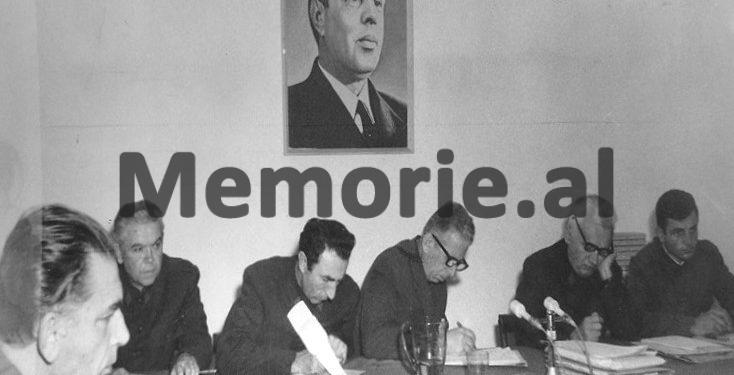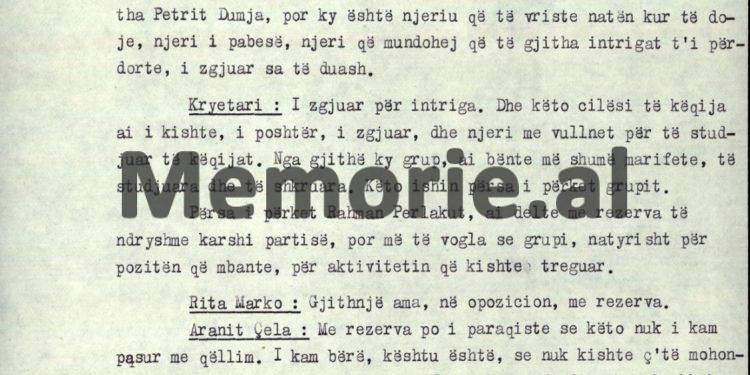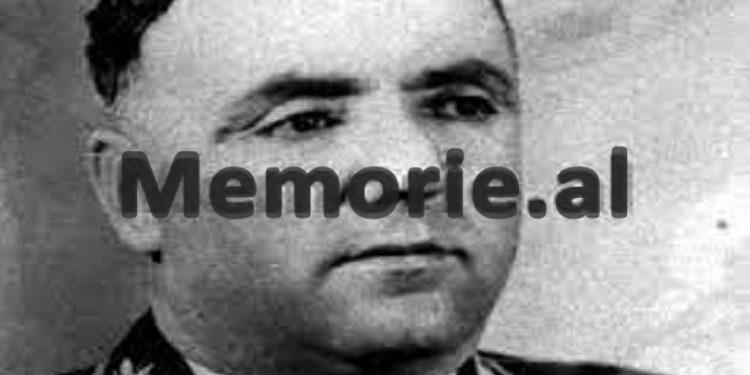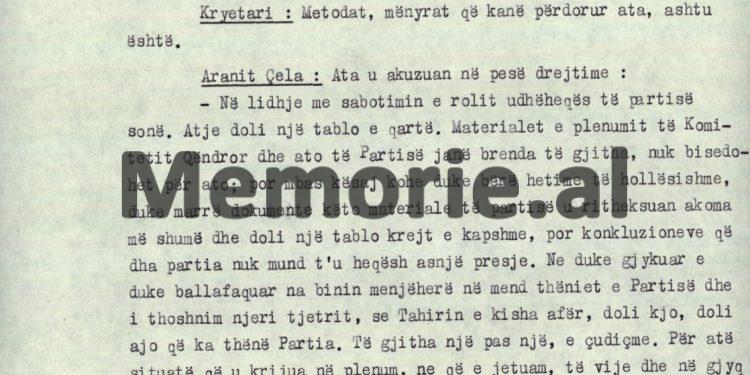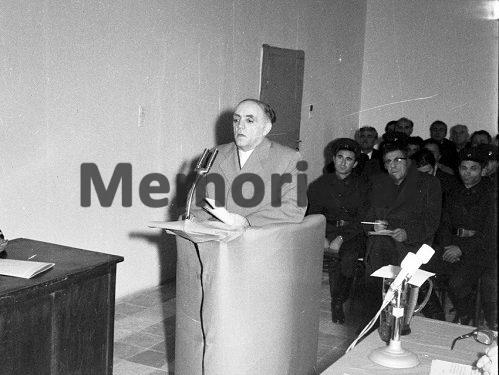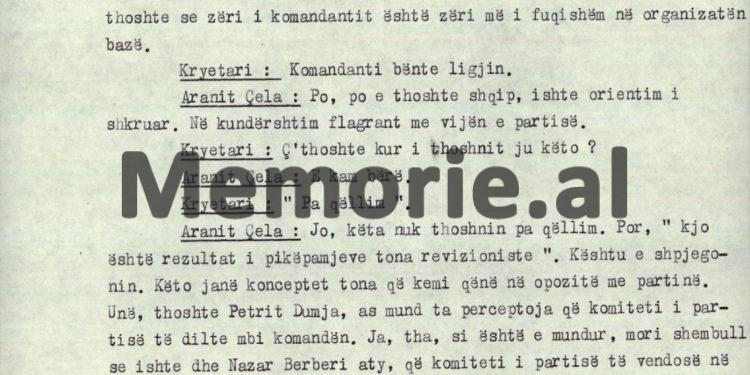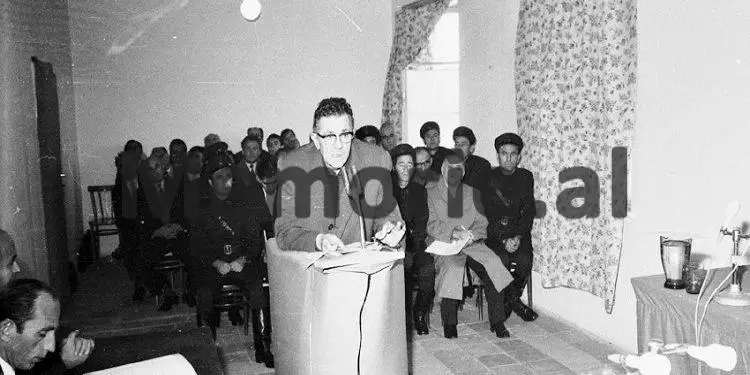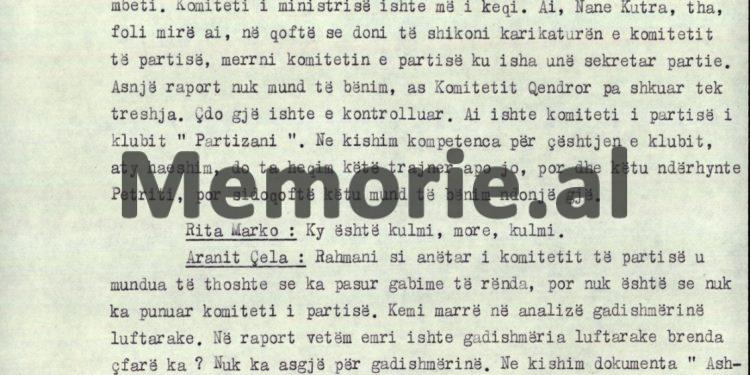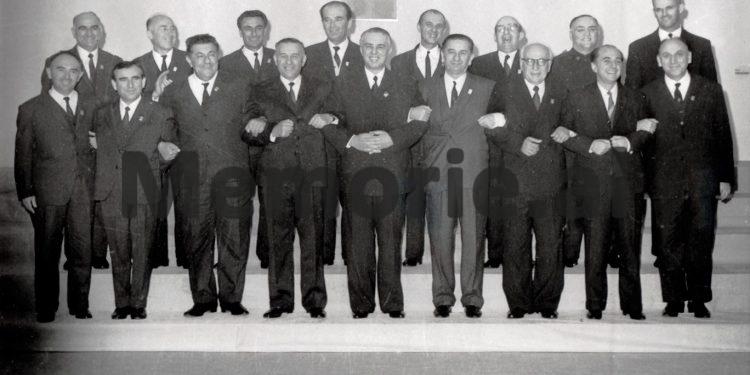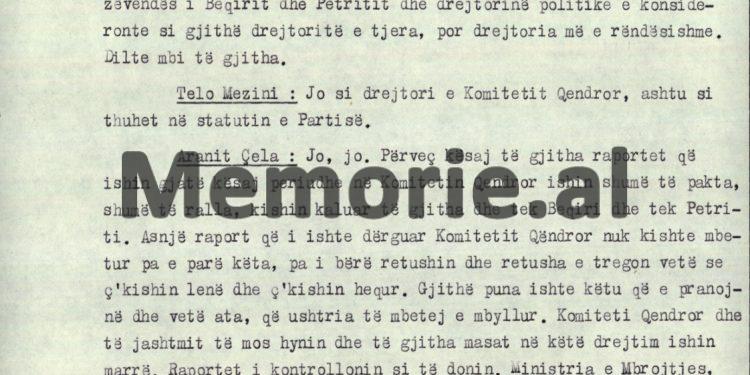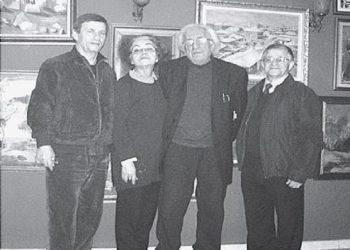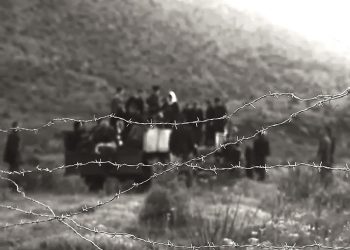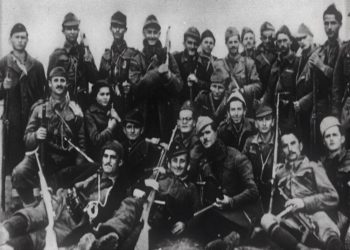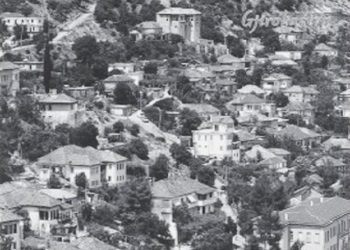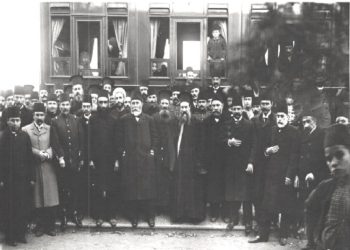By Dashnor Kaloçi
The third part
Memorie.al/ On November 5, 1975, exactly 49 years ago, the president of the Supreme Court of the People’s Republic of Albania, Arani Çela, by means of a letter marked “Top Secret”, addressed to the Presidium of the People’s Assembly, attached a copy of the decision of that court, with a summary of the indictment of the death sentence, by firing squad, of the three former generals, the highest leaders of the Ministry of Defense, Minister Beqir Ali Balluku, the Chief of Staff of the General of the Army, Petri Taulla Dume and the Director of the Political Directorate, Hito Shaqo Çako, as well as the 25-year prison sentence of Rrahman Parllak, former Deputy/Chief of the General Staff of the Army, in the Ministry of People’s Defense.
The trial against them, held from October 25 to November 5 of that year, in an improvised hall in the premises of Ward 313 of Tirana, (otherwise known as the “Old Prison” or “Kaushi”), where they also the investigative process, remained isolated and under strict security measures, since the period of their arrest, on December 6, 1974. The arrest of Balluk, Duma, Cako and Parllak, came after a period of nearly six months, collection of assets and plenums, developed with the highest cadres of the Ministry of People’s Defense, the secretariat of the Central Committee of the ALP and the Political Bureau, where Enver Hoxha personally assisted and directed most of them.
The attack on Beqir Balluk, who for years held the post of Minister of People’s Defense and first deputy prime minister in the government headed by Mehmet Shehu, as well as a member of the Political Bureau of the ALP Central Committee, began in June-July of in 1974, with the extended meeting of the Army Active, which was held in the former “Bird House” of the city of Durrës. That meeting was chaired by Mehmet Shehu and Hysni Kapo, where Balluku, for the first time, since 1945, was not in a meeting presidium, but in the hall, where he was forced to answer dozens of questions, asked by subordinates his. Everything that was happening there in that hall and that would continue until the day of the arrest, was pre-prepared based on a well-crafted scenario by the main leaders of the senior leadership of the ALP, such as Mehmet Shehun and Hysni Kapon , personally conceived and directed by Enver Hoxha.
After that activity with the highest cadres of the Army, Balluku was also analyzed in the meetings of the Political Bureau of the Central Committee of the ALP, where Enver Hoxha was the first to direct the attacks against him, accusing him of; “the head of the coup group in the Army” and “the biggest traitor that Albania had until that time”. After those meetings of the Political Bureau, Balluku was also analyzed in the Fifth Plenum of the Central Committee of the ALP, which was held on July 25, 1974, where he was attacked by the majority of the members of the plenum.
At the end of that meeting, Balluku was expelled and dismissed from all party and state functions, but, unlike many of the former officials and high-ranking personalities of the communist senior leadership, (who had been hit and convicted years before, who were arrested and handcuffed as soon as they left the assembly hall), he was released to go home! Where after ten days, together with part of his family, he would be interned in the town of Roskovec, in the district of Fier, where he was arrested on December 6, 1974.
Now all this and more for Beqir Balluk, the former Minister of People’s Defense and the first deputy prime minister of the government headed by Mehmet Shehu, who until 1974, was considered one of the closest collaborators and most loyal people of Enver Hoxha, are very popular, since after the 90s, dozens and dozens of testimonies and archival documents were also published, which shed light on his life and career, from the period when he was the main leader of the Guerrilla Units of of Tirana and commander of the Second Assault Brigade of the National Liberation Army, as well as the entire period in charge of the Ministry of People’s Defense, until July 1974.
What has remained an almost unsolved and unknown mystery, which continues to be discussed even today after almost five decades, are the main reasons and causes that forced Enver Hoxha to hit Balluk and the two main leaders of the Ministry of Defense, Petri Dumen and Hito Chako, sentencing them to death, as; “The leaders of the coup group in the Army”! Along with this mystery, which will probably never be solved, the archival documents with the minutes of the meetings of the Presidium of the People’s Assembly of the People’s Republic of Albania, where the requests and prayers for the pardon of life were discussed, are almost unknown the side of the three former leaders of the Ministry of Defense, Balluku, Dume and Çako.
Based on this, Memorie.al is publishing in several numbers these archival documents, where there are discussions of all the members of the Presidium of the People’s Assembly, starting with its head, Haxhi Lleshi, (President), Rita Marko (Vice President), Telo Mezini (Secretary), as well as members; Jovan Bardhi, Muharrem Sefa, Naunka Bozo, Nuredin Hoxha, Spiro Moisiu and Zinja Franja.
Continues from the previous issue
ARCHIVE DOCUMENT WITH THE MINUTES OF THE MEETING OF THE PRESIDIUM OF THE POPULAR ASSEMBLY, WHERE THE DECISIONS OF THE SPECIAL MILITARY COURT WERE DISCUSSED ON THE DEATH SENTENCES OF BEQIR BALLUKU, PETRI DUMES AND HITO ÇAKOS
RECORDS
Held at the extraordinary meeting of the Presidium of the People’s Assembly, dated 5.11.1975, Wednesday:
Comrades participate in the meeting: Haxhi Lleshi (Chairman), Rita Marko (Vice-Chairman), Telo Mezini (Secretary), Jovan Bardhi, Muharrem Sefa, Naunka Bozo, Nuredin Hoxha, Spiro Moisiu, Zinja Franja, (Members).
PILO PERISTERI: And it has been hidden for so many years!
ARANIT ÇELA: Regarding Petri Dumas, Hito Çakos, and Rrahman Përllaku, their activity is related to the opposition since the release of the Open Letter, until the announcement of the Theses of the Defense Council. Beqir Balluku used to say that I was expecting something from Petrit Dumja, that Petrit is an adventurous type, and he admitted that adventurism has always characterized him, that he has been unhappy, that he has had his own mind, illusions, let’s do this, let’s do it. That is, Petrit Dumja, was a guy exactly as Comrade Enver characterized him, a very dangerous putschist. A man who can do anything.
Hito Çako as a type, as it turned out in court, turned out exactly as the Party and Comrade Enver had defined it, an intriguing type. He was the last act of the tragedy, i.e., he went to both Beqiri and Petrit, arranged it with one, and with the other, he entered everywhere as “joli”, in all these jobs. It’s one, it’s the other. Petrit Dume, although he was meaning himself, made a determination to Hito Chako, saying that he was the meanest, the most mischievous, the most vagabond. All of us are vile, said Petrit Dume, but this is the man, who would kill you at night, when you wanted, treacherous man, who used all intrigues. As smart as you want.
CHAIRPERSON: Smart for intrigue. And these bad qualities, he had. Sneaky, clever, and a man of will, to study evil. Out of this group, he did the most stunts. Studied and written. These were in terms of the group. As for Rrahman Përllaku, he came out with various reservations, against the party, but smaller than the group, of course for the position he held, for the activity he had shown.
RITA MARKO: Always but, in the opposition, with reservations.
ARANIT ÇELA: I was presenting them with reservations, because I did not have these on purpose. I did it, that’s right, because he had nothing to deny, but I had no intention. In the last word he said, I fully agree with these accusations, maybe a bit late, that’s how it is. That was their personality.
Regarding the charges…!
TELO MEZINI: For Rrahmani and Hito, nothing came of their connections with Koci Xoxen, and others?!
ARANIT ÇELA: No, Hito comes out. But Rrahman did not find anything significant; there may be things that are known.
CHAIRPERSON: That Rrahmani was also with Koci.
RITA MARKO: Rrahmani was Koci’s favorite person.
CHAIRMAN: Rrahmani, Hito, Koci, were collaborators of the Yugoslavs.
ARANIT ÇELA: Nothing special in this regard came out. These are known and we pointed them out. I am trying to say something that was not known.
RITA MARKO: These were agents like this…?!
ARANIT ÇELA: In the conclusion of the court’s decision, it appears that these four, for the way they developed their activity, for the contacts they had and the work they did, these are agents of the Yugoslavs and the Soviets, regardless of whether they have papers or not, yes all their activity leads there.
CHAIRPERSON: The methods, the ways they used, that’s right.
ARANIT ÇELA: They were accused in five directions:
Regarding the sabotage of the leading role of our Party. A clear picture emerged there. The materials of the plenum of the Central Committee and those of the Party are all inside, they are not discussed. But after this time, making detailed investigations, receiving documents, these materials of the party, were re-emphasized even more, and a completely understandable picture emerged, but the conclusions that the party gave, you cannot remove a single comma.
While we were judging and confronting each other, the statements of the Party immediately came to mind, and we said to each other that Tahir was close to me, this came out, what the party said came out. All, one by one, strange. For that situation that was created in the plenum, those of us who lived through it, come to the court where I was, see that we also had the documents in front of us, and I thought we have so many documents, that we look at and draw conclusions, but there in plenum, all these documents, were not. There were only a few and the conclusion was as accurate and precise as I can tell you more.
PILO PERISTERI: The sharp eye watches them.
ARANIT ÇELA: Yes, the sharp eye looks at them; we were talking about ourselves, who were not very sharp.
TELO MEZINI: He is Enver Hoxhe.
ARANIT ÇELA: Regarding the leadership role of the Party, they fully accepted and it emerged from the documents, that the state of the basic organizations of the party committees, and the role of the command over the party, had become a boring and disgusting thing. In the court, they counted the specific crimes and said that the leading role of the party did not exist. Petrit Dumja told us, gentlemen judges, don’t try to make comparisons, because no comparison can be made. I have also been in field organizations, but even night and day am not enough to make a comparison between the basic organization of the army and the one in the field. Here the Party had nothing to eat, the commander. Concrete faults emerged. Hito Çako, in a speech, said that the commander’s voice is the most powerful voice in the basic organization.
PRESIDENT: The commander, he made the law.
ARANIT ÇELA: Yes, yes, he said it in Albanian, it was a written orientation. In flagrant opposition to the party line.
PRESIDENT: What did you mean, when you said these things?!
ARANIT ÇELA: I did it.
CHAIRPERSON: “No purpose.”
ARANIT ÇELA: No, they didn’t say it without purpose. But; “this was as a result of our revisionist views”. That’s how they explained it. These are our concepts, which we have been in opposition with the party. I, said Petrit Dume, could not even think that the Party Committee would rise above the command. Here, he said, how it is possible, he took the example that Nazar Berberi was also there, so that the party committee could decide on the war situation.
Mr. Judge, you were an artillery commander in Pogradec, in minus 18 degrees, how will the Party Committee meet?! Don’t worry, he told him, how the Party Committee will be convened, we convened it then, where were you?! “Yes, she was extraordinary.” More, we collected it; we collected it, but not as you say. With the party committee, it was done, then minus 18 degrees, there is no here, the second, the party has given clear instructions on how this work will be done.
PRESIDENT: The party is everywhere, and in command.
ARANIT ÇELA: He said, I was in the opposition with the Party, for the Party to decide. Without command, there is no army. Hito Chako said it. I have said it in Albanian, everywhere and I do not deny it, that without party committees the war is fought, while without headquarters, it is not. This is a whole written and unwritten line, this issue was not even discussed, what they had said. In relation to the party committees, they were poorly prepared. This emerged from the documents, that we also received the agenda and from what they themselves, the witnesses, say. Party committees were like political sections, if you remember in the army.
There was no change and they said that nothing had changed in the army, but that situation remained. The Ministry Committee was the worst. That Nane Kutra said, he spoke well, if you want to see the cartoon of the party committee, take the Party Committee, where I was the secretary. We could not make any report, not even to the Central Committee, without going to the trio. Everything was controlled. He was the Party Committee of the “Partizani” Sports Club. We had powers over the affairs of the Club. We were eating there; we’re going to get rid of this coach, right? But even here, Petriti intervened. But anyway, we could do anything here.
RITA MARKO: This is the peak, the peak.
ARANIT ÇELA: Rrahmani, as a member of the Party Committee, tried to say that there were serious mistakes, but it is not that the Party Committee did not work. We analyzed the combat readiness. In the report, only the name was combat readiness, but inside, what is there?! There is nothing about readiness. We had documents. “That’s right, it’s taken.” No one even asked the Party Committee about the issue of salaries.
Even in dozens of cases, they had reached such impositions, such as, for example, the Party Committee had decided for a person to come here, when they found out, they told them on the phone, it is not right, cancel it, screw this up. A characteristic was required, it was done by the Party Committee of the Ministry, or of the Corps, Petrit didn’t like the characteristic, for example, for a George the Titan, a vagabond, and he said to Hito, go there and change the characteristic. Gather the Committee and change it. As much vile as you want.
RITA MARKO: The son of Petraq Titan, chief of staff, what happened?
ARANIT ÇELA: He was connected with foreigners. They openly defended him, although these came out, they still put him in as an officer. Also, the Political Directorate was completely placed at the disposal of Balluk and Duma, but also of Chako, who was a loyal servant. He stated this in court, that I have always considered that the Political Directorate was like all other directorates, and I am the deputy of Beqir and Petrit. There was also a document written, some two or three years ago, that told all the other cadres that I am the deputy of Beqir and Petriti and the Political Directorate, he considered it like all the others. But the most important directory stood out above all.
TELO MEZINI: Not as the Director of the Central Committee, as stated in the Party’s status.
ARANIT ÇELA: No, no. In addition, all the reports that were during this period in the Central Committee were very few. They were very rare and had all passed from Beqiri to Petrit. No report that was sent to the Central Committee was left without being seen by them, without being retouched, and the retouching shows themselves, what they had left and what they had removed. All the work was here, as they they admit, for the army to remain closed. The Central Committee and outsiders were not allowed to enter and all measures were taken in this direction. They controlled the reports as they wanted. The Ministry of Defense, was their slogan, it was not a ministry, like all the others, it does not depend on the government.
The government should not know the state of the army, the Politburo should not know the state of the army, only two or three leaders, which are the Defense Council, should be concerned with the state of the army. They lied that they had not given anything to the Defense Council, but until now they accepted the Defense Council, while the Political Bureau did not ask at all. They had the Defense Council as an argument, not to say that they had gone further, and that they had not given him anything, only two pieces of information, at the request of comrade Mehmet. All this work was for the army to remain closed and to prepare for their goals. Beqiri arrived, to accept him there with difficulty, and in the debate he said: “Here, gentlemen judges, there were two eggs, which would be cooked one day. The egg that would be stronger, would win. It happened that our weakest egg was broken,” he said openly.
Voice: Like…?! He also said that the work would end here; the two faiths would solve it.
PRESIDENT: I believe these were recorded?!
ARANIT ÇELA: Everything. Until then, say what you want, in the coup we would do it. They used false information and fraud. Two reports were made, one for the Central Committee, and the other for Beqir and Petrit. Take both, they are both, Hitoja was saying. In the report sent to Beqiri, the real situation was given. I am telling a small fact. It was reported to the Central Committee, regarding the damages, it was also reported to Beqir. The Central Committee was told that some damages had occurred, while Beqir was told all the violations, among other damages, was a figure, I ask him how many potatoes were damaged in Kazan’s Neck?! Three thousand. Who did you tell the truth?! Bekirs. In the report that was sent to friend Hysni, 300 sq. But why so?! Yes, our efforts to hide the state of the army.
RITA MARKO: From the smallest things to the biggest things, it seems their hostile work.
ARANIT ÇELA: They didn’t even know this line of measures at all. The second charge is sabotage in the defense of the country. Serious thing. They were against theses, in three directions.
In the direction of military art.
In terms of fortifications.
And combat training.
In terms of military art, their theory was that of antitheses. It became clear what Petriti lied to us in the plenum; “I didn’t take it, and I didn’t do it”, in fact he took it all, they were found with notes, he also did something mean that I will tell you. Beqiri told lies there, but here is a trial. You have received the first material, the second, the third, and the 18-page speech, which was made before the material and is the starting point of all this work that I have done. No, I didn’t get it. Order and see the documents. There are archives.On this date, you got this or that. Are these your notes?! Yes. Finally, he admitted that he has received all of the things he lied to us about in the plenum. We did not mention those of the plenum, because it was a trial, what was our business. They generally agreed with their line, which was in opposition to our military art, and to the interests of the country, where the conclusions are.
What Comrade Enver said in the Plenum? They were for a partisan war, which according to them would never be a partisan war, they were not for a war on a regular front, they were for the release of the territory and in the end they accepted this. Now for this issue of other antitheses, they had done them together; it was another work that had been done by three Kalemxhins who were led once by Rrahmani, once by Beqiri. They had given their opinions, to do this, to do that, we also found their notes. What had they done when it came to discussion? The plan was this as they say, Beqiri that Petriti had reservations, and says only the main cadres of the ministry, Beqiri also says the corps commanders, set the date to discuss in Golem, with 300 people. A day before, Petriti sends him a letter, the letter was found, he had also kept a copy, why did you keep the copy, I kept it, so that in case of danger, I would be washed. In two copies, Petriti never wrote, he rarely wrote, I recognized everyone’s handwriting, I barely recognized him.
The letter was addressed to Beqir, and what the vagabond said: “Comrade Minister, the cadres have reacted badly, regarding the distributed material, the cadres are against, in order not to create any difficult situation, to withdraw this material urgently, which was distributed without your knowledge and mine, and the people who have processed this material, be criticized at the meeting”. Comrade Mehmet and Comrade Hysni would be present at this meeting, and they beat Rrahman Përllak, Ernest Jakovo, and the other one, and excused Beqir, you and I, we don’t know about the distribution, or about the material. We save you, and they eat it. Rrahmani knew that this maneuver was going to burn, and he insisted that the discussion be held. The next day, Beqiri came urgently and collected the material and the remarks they had made. What Petriti told him to criticize, Beqiri did not eat, to criticize the anti-Marxist views that appear in the theory of military art. I tell him; what about you, Petrit, why didn’t you pick it up, what about you Rrahman?! If they didn’t eat it, all this work would come to them. Beqiri also said; “I didn’t say that I was involved in these things myself, how would I criticize them, when I was the initiator”. Memorie.al




